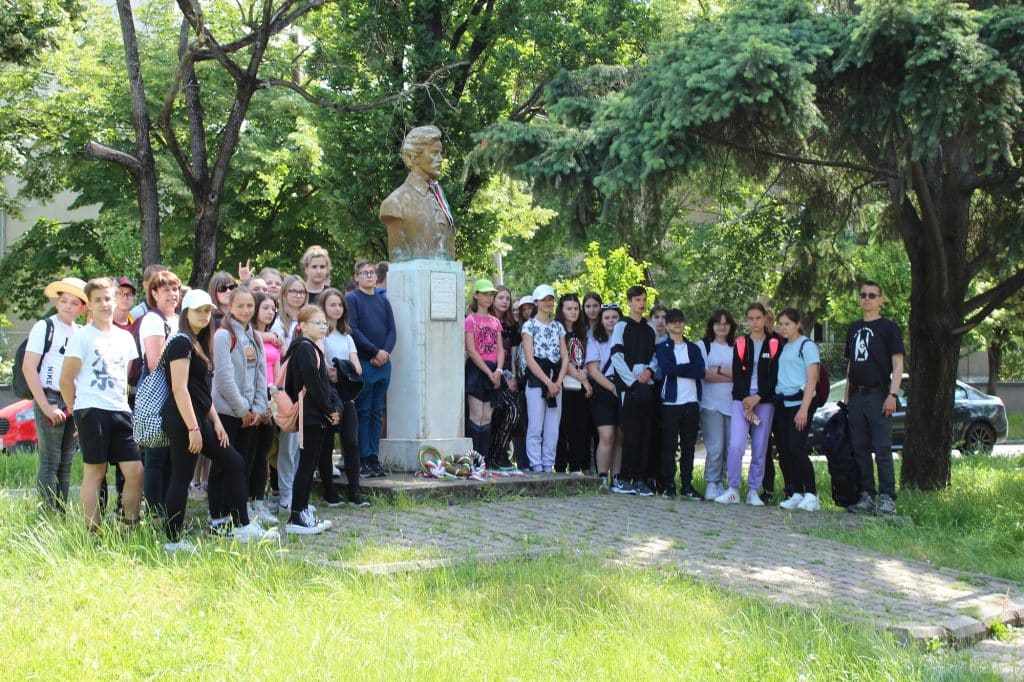– advertisement –
Medve-tó, Csigadomb educational path, Békás-szoros, just to name a few of the wonderfully beautiful places visited by 7th graders from Székács Evangelical School thanks to the Limitless Program. In addition to learning about the landscapes of Transylvania, the aim was for the children to gain personal experience of being Hungarians abroad.
Határtalanul is a program of national unity, aimed at building Hungarian relations, establishing and deepening interpersonal relations. Within the framework of the programme, students of Hungarian schools, with state support, participate in class trips to Hungarian-populated areas of neighboring countries. The Székács Evangelical School in Orosház also submitted a successful application, so the seventh graders were able to visit Transylvania. 53 students and 4 accompanying teachers participated in the trip between 5 and 9 June.
– We spent the first day in Nagyvárad, our tour guide, Brigitta Bicsak, told us about the city with great love – I started to accompany the teacher János Patakfalvi. – Introduce our group to the cathedral and the bishop’s palace, tell us why Nagyvarad is called the city of St. Laszlo, and also talk about the influence of this place on the poetry of Endre Ade. We stopped in Sándor Petőfi Park, where we laid a wreath at the poet’s statue, and then one of our students, Dániel Arva, recited one of Petőfi’s poems.
After admiring Királyhágo, the group’s excursion leads to the place of residence, Farkaslaka. The next morning, refreshed and rested, they set out for the Baraged Salt Mine.
– We learned about the history of the formation of the salt mine, the children could hear about how people use natural resources, – continued Janos Batakfalvi. – They really enjoyed this, as well as the hours they spent at Bear Lake, where we got to hear the legend of the lake and then walk the nature trail among its many natural treasures.
The Csigadomb Education Trail in Korond was also very popular, with the group touring with the help of geologist Ferenc Zoltán Pál. After viewing minerals, aragonite became the focus of attention, at the Aragonite Museum, students and teachers at the school in Orochaz could hear about the mining and processing possibilities of the carbonate mineral.

– We relaxed a bit on the bazaar line in Corund, the kids bought some nice souvenirs, and then back to Varkaslaka, where we laid a wreath at the grave of Áron Tamási. We also walked together to the Trianon Monument, where, in addition to laying a wreath, Danil Arvay once again pleased us with a poem. It is important for children to learn about the past and history of our people, and this is what this program is about – continued the accompanying teacher.
On the third day, the goal was the Békás Gorge, where the group walked along the rocky walls of the tectonic gorge. Upon arriving at Gyilkos Lake, after learning about the legend, they walked around the lake on a beautiful nature trail and admired the flora and fauna of the area. The next day, the people of Székely traveled to Székelyudvarhely, in the city center stopping at the Statue Park and then at the Millennium Monument. Then they took a bus to Szentegyháza, where a huge adventure awaited them.
First, they ride a tractor, but already from the shelters they start on foot to the top, Madarasi Harjita, the sacred mountain of the Zecklers. Along the way, they also saw a fox, and although they did not come across a bear, its tracks were discovered on the ground in the form of excrement.









– On the last day of our purposeful journey, we laid a wreath at Petofi’s grave in Vigereghaza, the national anthem was played, and then, in Sigismar, we went up the student stairs and stopped at the clock tower. They had a bit of muscle fever at that point, but the kids dealt well with the stress. After our Diva walk our journey led us home, some students said they would like to return to Transylvania with their families in the near future. Our hosts greeted us with great love, and what stood out most to us was how lovingly our guides spoke of their homeland. This was beneficial for all of us, – concluded Janus Patacfalvi.
The program was implemented with the support of the Hungarian government.
Photos: Sikach Lutheran School group












































